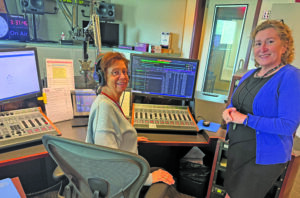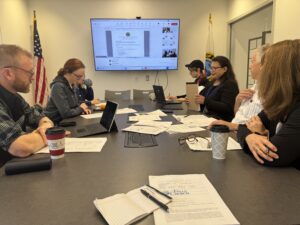Robust economic development provided the City of Falls Church with a significant net surplus in revenues over expenditures in the last fiscal year, but the challenge will be to address how things will go going forward in the face of the mass federal layoffs, firings and government shutdown impacts that the Trump administration has been inflicting, impacting this region especially hard.
A final report of the City of Falls Church budgetary performance for its FY25 fiscal year that ended last June 30 showed a healthy net surplus of revenue over expenditures. But some areas signaled a cause for concern going forward, as the Falls Church City Council discussed at its work session Monday night, following the report’s initial unfurling at a meeting of the Council’s Budget and Finance Committee the previous Friday morning.
For the past year, the City’s commitment to economic development saved the day, with a robust increase of funds from licensing and permits boosting the total into the plus column.
While revenue from real estate, personal property, sales, meals and business license taxes came in a total $465,861 below budgeted expectations, a half percent off, revenues from other sources, mainly greater returns on investment due to higher than expected interest rates, up a whopping 56 percent, and, more importantly, licenses and permits, mostly associated with new commercial development, up 18 percent over budgeted expectations, drove an overall increase in revenues to the City, which combined with some under-budget spending, produced a 2.6 percent net increase in overall revenues.
Sales and meals taxes, two critical indicators of where the City may be heading in the wake of its two-decades-long strong economic development, were both significantly below budgeted expectations, however. Sales taxes were 2.3 percent below and meals taxes 10.4 percent below budgeted expectations, though both were up overall from the previous year.
City Manager Wyatt Shields signaled in the meeting last Friday that “a key barometer” for the meals and sales categories is online sales, and that measure was down 6 percent. Also, City Treasurer Jody Acosta reported that the number of citizens seeking help with their real estate taxes has tripled in the last year.
With its net surplus, however, the City staff has recommended a variety of ways of expending the funds, which all must be for one-time uses, including adding $1 million to its reserve fund balance and funding a list of minor uses that the Council will vote on in the coming month.
The surplus will contribute nothing to the City’s schools under the existing revenue sharing agreement, however, as funds calculated for that 50-50 sharing agreement are only allowed from local tax revenues, and those were down, not up.
The City staff recommendation for allocating the surplus also includes nothing for enhanced City Hall communications with citizens, a need that dominated discussion at a recent City Council candidate forum. A suggestion from Council member Laura Downs at Monday’s work session came in light of her observation campaigning for re-election door-to-door. She said she encountered numerous citizens who do not use the Internet frequently, or at all, and they feel left out of the loop on community events and issues, and so she recommended a small portion of the surplus be used for a weekly City ad in the News-Press.
Other items that the City staff recommended the surplus be used to fund included a solid waste transition cost, organics bins, Sherrow Ave. and Cameron Ave. demolition, Arts and Humanities Council, emergency financial assistance, Vietnamese community outreach, Planning Commission increase in pay, vehicle surplus sales, augmentation of a two percent transient tax for business district improvement, the Founders Row theater rebate, and urban forestry contributions. A recommended $1,022,129 would be added to the capital reserves.
While the fiscal year ending report was for the year ending last June 30, a better indicator of the direction of the City’s resilience in the face of the mass federal and contractor layoffs in the region will come with the release of the numbers for the first quarter of the current FY26 fiscal year (from this July through September), which will be released in mid-November.
It is hoped that, once again, the City’s level of economic development will mitigate otherwise downward trends, as evidenced by the announcement today that the City had just received a $460,000 check from the Founders Row project.













